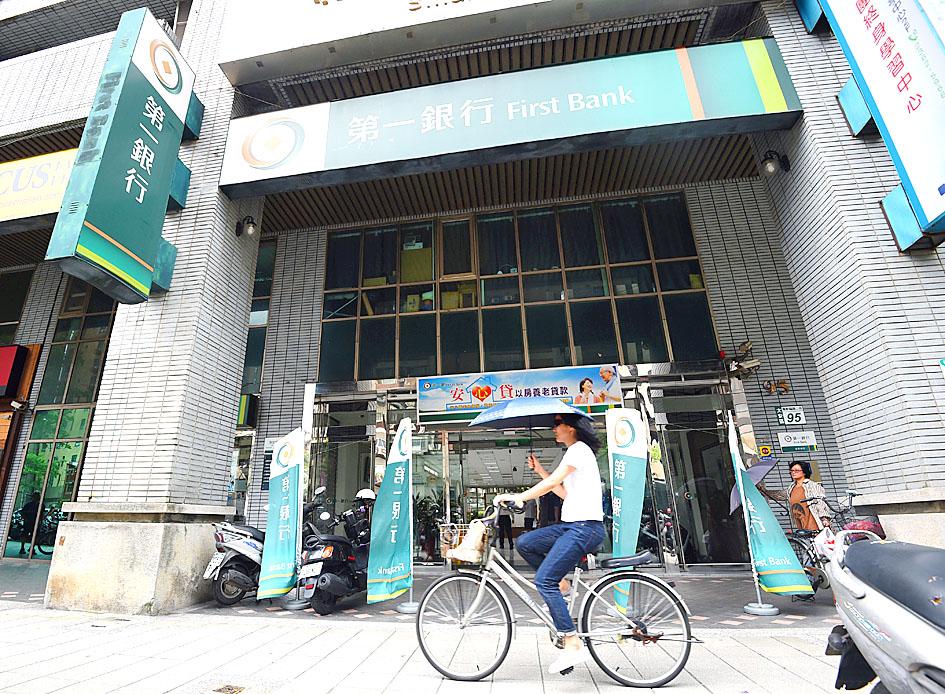State-run First Commercial Bank (第一銀行) forecast that its loan growth would reach 7 to 8 percent this year, following an 8 percent increase to NT$1.91 trillion (US$67.5 billion) last year, bank vice president Tsai Su-hwei (蔡淑慧) said.
Benefiting from a low interest rate environment, corporate loan growth at the banking arm of First Financial Holding Co (第一金控) is forecast to reach 8 to 9 percent this year, along with 4 to 5 percent growth in mortgage loans, Tsai said at an online earnings conference on Thursday.
In addition, the company’s net fee income is predicted to grow 15 percent this year on the back of steady growth in the economy, compared with a decline of 6.8 percent to NT$7.33 billion last year, she said.

Photo: Peter Lo, Taipei Times
The bank’s net interest margin is likely to fall to 0.95 percent in the first half of this year, from 1 percent at the end of last year, due to less interest income from bonds, it said.
First Bank’s net profit fell 17.6 percent year-on-year to NT$15.68 billion last year, as the net interest margin was affected by central banks’ expansionary monetary policies and its investment gains fell amid the COVID-19 pandemic.
The bank, established in 1899, has 194 branches in Taiwan, 16 branches abroad and a subsidiary in the US. Its lackluster performance was in stark contrast with its securities and insurance affiliates, which benefited from the booming equity market in Taiwan.
First Securities Inc’s (第一金證券) net profit reached NT$744 million, up 173.5 percent year-on-year, while its insurance affiliate First Life Insurance Co’s (第一金人壽) net profit was NT$485 million, up 98.8 percent, First Financial data showed.
Overall, First Financial’s net profit fell 13.2 percent to NT$16.81 billion last year from a year earlier, which translated into earnings per share of NT$1.31. The company’s net value per share was NT$17.23 last year and its return on equity was 7.6 percent.
First Financial said its asset quality continued to improve as First Bank’s nonperforming loan ratio fell to 0.24 at the end of last year, from 0.29 percent in the first half of last year, and the bank’s loan-loss coverage ratio stood at 527 percent, up from 404 percent at the end of June.
The financial holding’s capital adequacy ratio (CAR) was 125.25 percent at the end of last year, up from 123.18 percent at the end of June, while its banking unit’s CAR was 13.63 percent and tier-1 CAR was 11.66 percent, compared with 43.43 percent and 11.44 percent six months earlier respectively, company data showed.
The company said its dividend payout ratio would remain at about 60 percent this year.
Jih Sun Securities Investment Consulting Co (日盛投顧) said in a note on Friday that First Financial’s outlook for this year appears positive, as its banking unit’s loans are forecast to grow in high single-digit percentages and its net interest margin is expected to remain stable, while credit cost is predicted to decrease from last year due to less corporate risks.

Zhang Yazhou was sitting in the passenger seat of her Tesla Model 3 when she said she heard her father’s panicked voice: The brakes do not work. Approaching a red light, her father swerved around two cars before plowing into a sport utility vehicle and a sedan, and crashing into a large concrete barrier. Stunned, Zhang gazed at the deflating airbag in front of her. She could never have imagined what was to come: Tesla Inc sued her for defamation for complaining publicly about the vehicles brakes — and won. A Chinese court ordered Zhang to pay more than US$23,000 in

Taiwan Semiconductor Manufacturing Co (TSMC, 台積電) yesterday said that its investment plan in Arizona is going according to schedule, following a local media report claiming that the company is planning to break ground on its third wafer fab in the US in June. In a statement, TSMC said it does not comment on market speculation, but that its investments in Arizona are proceeding well. TSMC is investing more than US$65 billion in Arizona to build three advanced wafer fabs. The first one has started production using the 4-nanometer (nm) process, while the second one would start mass production using the

A TAIWAN DEAL: TSMC is in early talks to fully operate Intel’s US semiconductor factories in a deal first raised by Trump officials, but Intel’s interest is uncertain Broadcom Inc has had informal talks with its advisers about making a bid for Intel Corp’s chip-design and marketing business, the Wall Street Journal reported, citing people familiar with the matter. Nothing has been submitted to Intel and Broadcom could decide not to pursue a deal, according to the Journal. Bloomberg News earlier reported that Taiwan Semiconductor Manufacturing Co (TSMC, 台積電) is in early talks for a controlling stake in Intel’s factories at the request of officials at US President Donald Trump’s administration, as the president looks to boost US manufacturing and maintain the country’s leadership in critical technologies. Trump officials raised the

From George Clooney to LeBron James, celebrities in the US have cashed in on tequila’s soaring popularity, but in Mexico, producers of the agave plant used to make the country’s most famous liquor are nursing a nasty hangover. Instead of bringing a long period of prosperity for farmers of the spiky succulent, the tequila boom has created a supply glut that sent agave prices slumping. Mexican tequila exports surged from 224 million liters in 2018 to a record 402 million last year, according to the Tequila Regulatory Council, which oversees qualification for the internationally recognized denomination of origin label. The US, Germany, Spain,